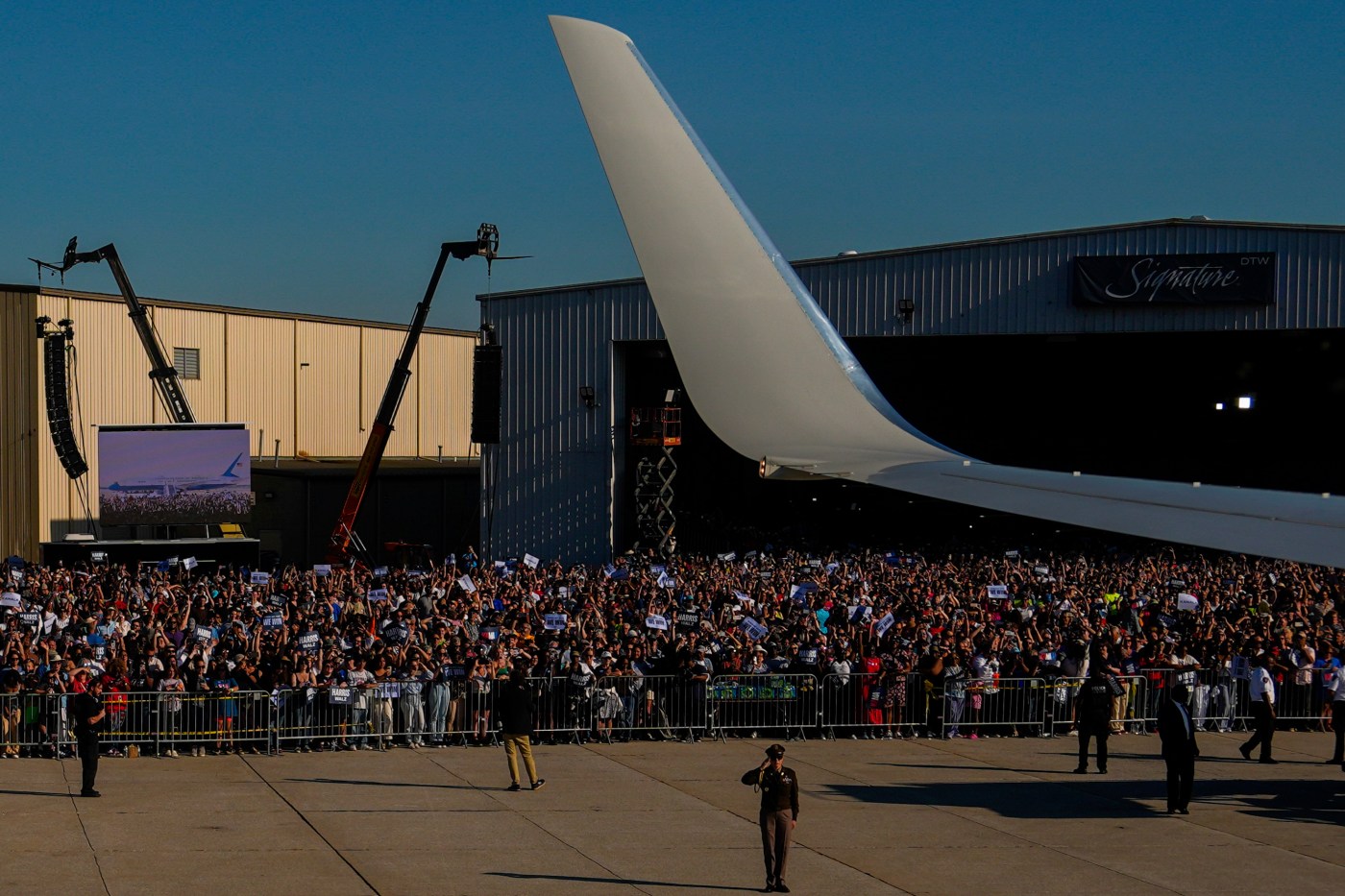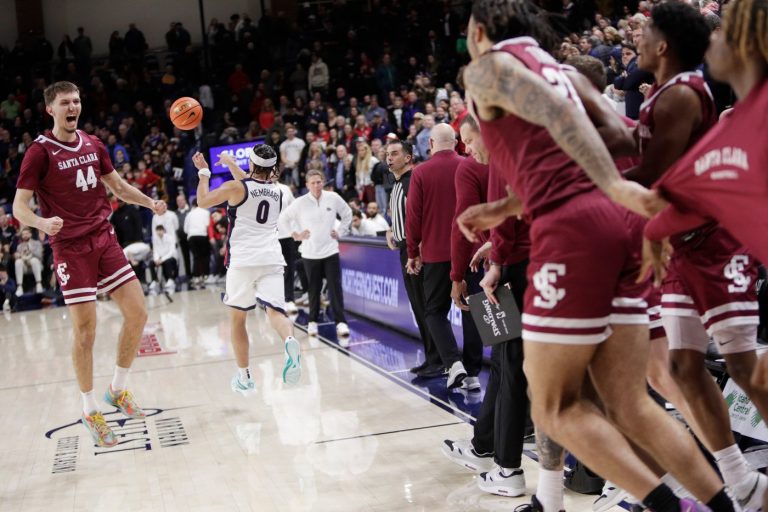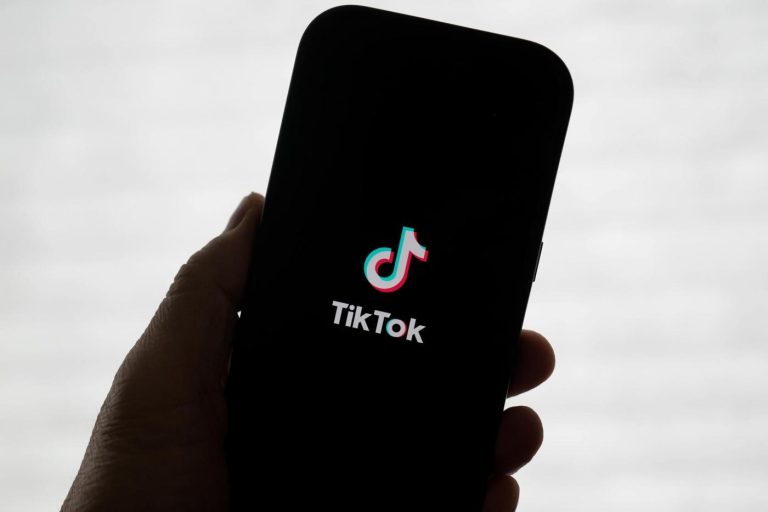When Donald Trump says something ludicrous and unhinged, it is often difficult to tell if he is acting out of feral political calculation or narcissistic injury. We saw this on Sunday, when he claimed that Kamala Harris had used artificial intelligence to fake an image of an enthusiastic crowd greeting her when she arrived in Michigan.
“There was nobody at the plane, and she ‘A.I.’d’ it, and showed a massive ‘crowd’ of so-called followers, BUT THEY DIDN’T EXIST!,” Trump wrote on his vanity website Truth Social.
His argument, such as it was, was based on a conspiracy theory floating around febrile corners of the internet that purported to find evidence of Harris’ deception in her plane’s reflection. “Same thing is happening with her fake ‘crowds’ at her speeches,” Trump added. “This is the way the Democrats win Elections, by CHEATING — And they’re even worse at the Ballot Box. She should be disqualified because the creation of a fake image is ELECTION INTERFERENCE.”
One way to read this post is that Trump is delusional. He can’t cope with Harris besting him on the metric he’s long valued the most — the size of his audience — and so is denying reality and having a tantrum. But however disordered Trump’s mind might be, I suspect there’s also a sort of strategy at work here. He is helping his supporters build a rationale for rejecting the election results if Harris wins.
Spurring chaos
Those who refuse to believe that Joe Biden won the 2020 election often cite modest turnout at Biden rallies, or enormous audiences at Trump ones, as proof that the election was rigged. This was always an absurd argument; if there was a direct connection between crowd sizes and vote share, Bernie Sanders would have been a Democratic presidential nominee. But it felt true to the members of Trump’s base, who’ve convinced themselves that their movement represents the true expression of the national will.
Some Trump fans certainly understand that they constitute a numerical minority in this country. But others are cloistered enough to believe Trump when he insists that he is overwhelmingly beloved, as he did at his Mar-a-Lago news conference last week, when he claimed that the MAGA movement encompasses 75% of Americans. I doubt many people registered this lie, jammed as it was amid so many others. But some of his die-hard fans heard it and took heart. “You know if he’s saying that, he has the data to back it up,” said a post from a popular account on Truth Social. “Meaning this election is gonna be too big to rig.”
As that post suggests, the conviction that Trump is uniquely popular makes it easier to justify the falsehood that the 2020 election was stolen. It also validates the belief that Trump will lose in November only if it’s stolen again. The ebullient throngs at Harris’ events — as well as her climbing poll numbers — threaten the worldview that sustains election denialism, and so they must be dismissed. For many MAGA adherents on social media, it’s an article of faith that enthusiasm for Harris has been manufactured as part of a “psyop” against Trump. Whether or not Trump buys into this self-soothing fantasy, he is encouraging his followers to get swept up in it.
As someone who very much wants to see Trump defeated, I’ll be pleased if he spends the next few months ranting about crowd sizes and telling himself that he’s ahead even if the polls say otherwise. But while the MAGA movement’s self-deception won’t help it win the election, it could spur chaos in the election’s aftermath. By insisting that Harris’ support isn’t real, Trump is bolstering the idea that if she prevails, it won’t be legitimate.
Embedded deniers
And while there’s nothing new in Trump refusing to accept electoral defeat, in 2024, his acolytes have embedded themselves in the systems that are supposed to make our elections function. A Rolling Stone investigation published in July found almost 70 election deniers serving as swing-state election officials. It quoted Marc Elias, a leading Democratic election lawyer, saying, “I think we are going to see mass refusals to certify the election.”
Related Articles
RFK Jr. reportedly reached out to Harris camp about cabinet post
US inflation drops to a 3-year-low, clearing way for rate cuts
Poll: Harris widens lead over Trump among California voters
There’s an apostrophe battle brewing among grammar nerds. Is it Harris’ or Harris’s? Walz’s or Walz’?
Gov. Tim Walz, VP Kamala Harris’ running mate, introduces himself to big California donors
In Georgia, the state board of elections, dominated by pro-Trump members, recently adopted a rule that will empower these election deniers. It allows local boards to pursue a “reasonable inquiry” — a phrase the state board didn’t define — into election results before voting to certify them. This rule is likely to be challenged in court, but if it stands, we can expect a bunch of amateur investigations into purported voter fraud in districts that Harris wins, as well as outright refusals to sign off on the results.
A report from the Brennan Center for Justice, a law and policy organization at New York University, suggests that the rule should cause concern but not panic: “If a rogue official refuses to certify an election, every state has enforcement mechanisms in place to make sure that certification proceeds on time.” But even if the system holds, Trumpist officials are likely to cause delay, confusion and uncertainty over the election’s outcome, all justified by the big lie that America has a MAGA majority.
The people who refuse to accept that Kamala Harris’ crowds are real are telling us they won’t accept that her votes are either.
Michelle Goldberg is a New York Times columnist.












